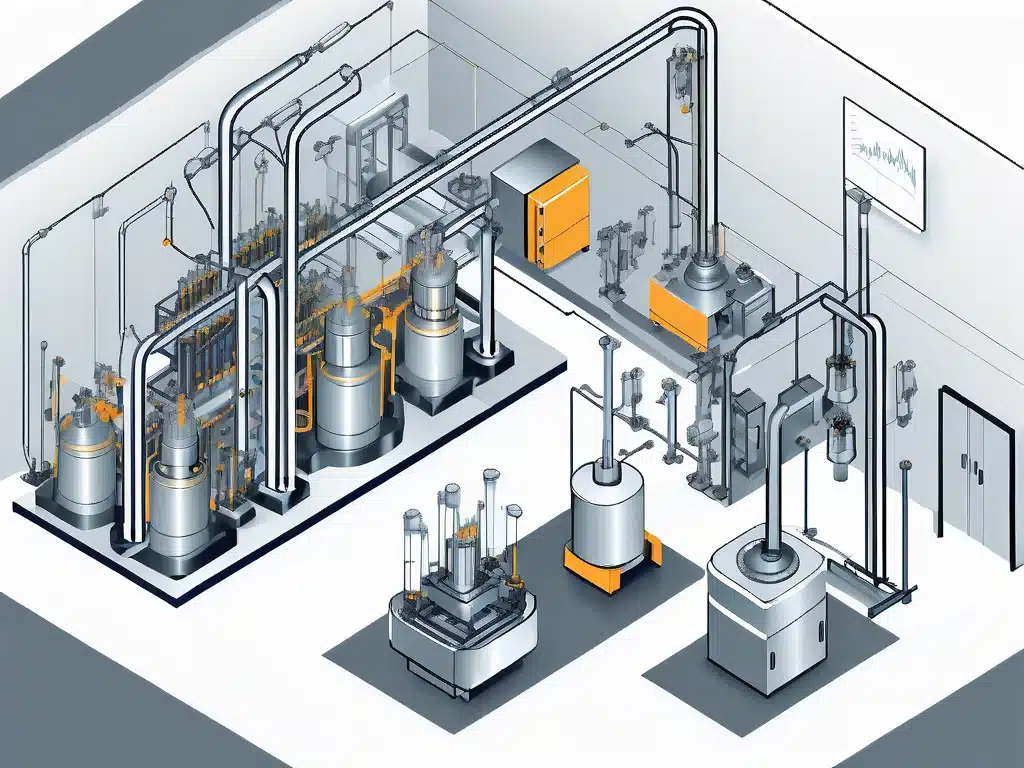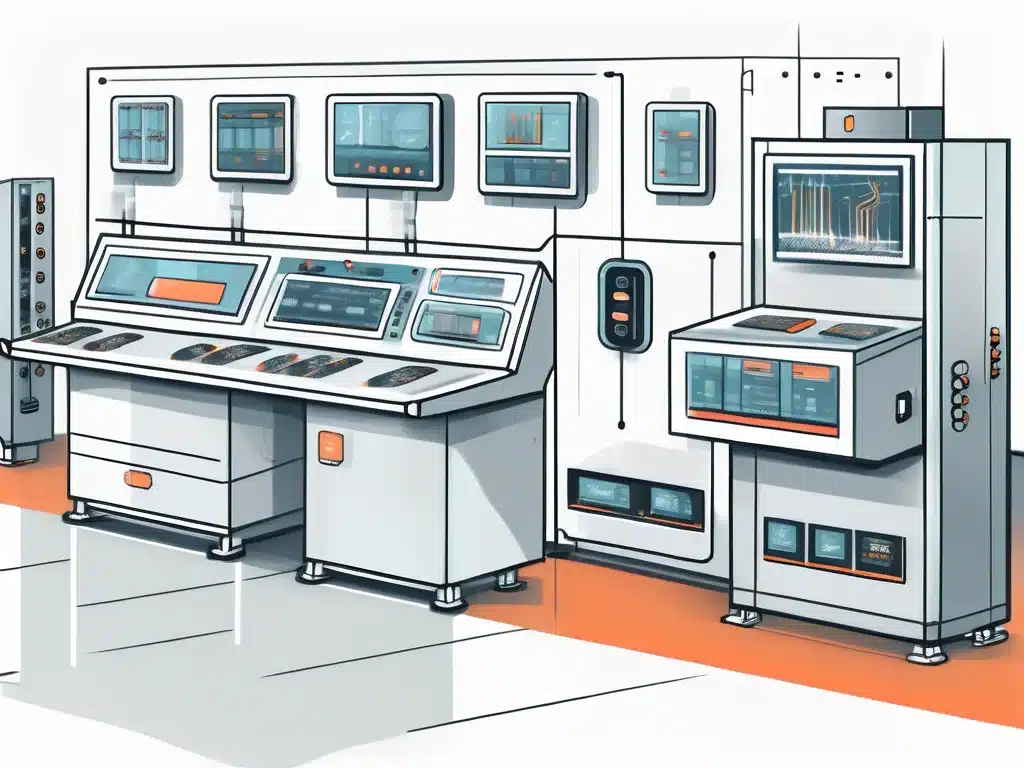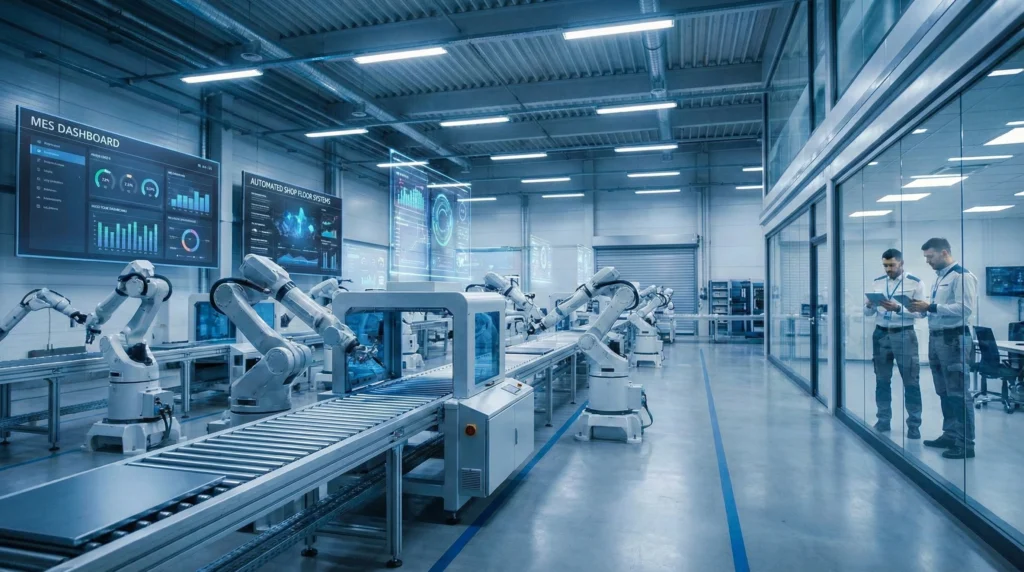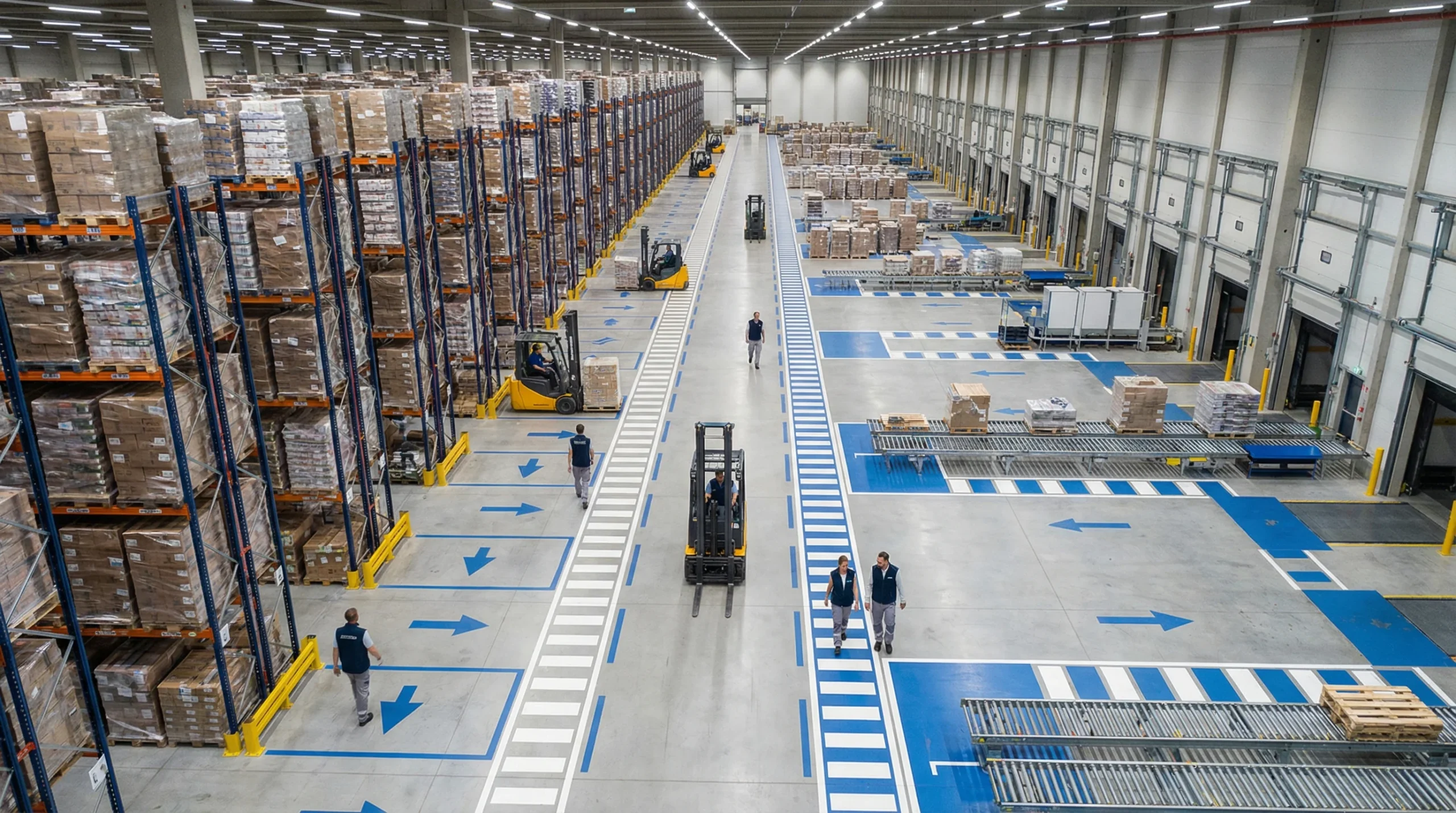In today’s competitive manufacturing landscape, optimizing operational efficiency is crucial for businesses seeking to gain a competitive edge. Manufacturers are constantly challenged to improve productivity, reduce costs, and enhance product quality. One key solution that is increasingly gaining popularity is the implementation of Manufacturing Execution Systems (MES) with Shop Floor Control capabilities. This article will explore the role of MES in manufacturing, its key features, the benefits of its implementation, and the challenges that may arise during the process.
Understanding the Role of MES in Manufacturing
Manufacturing Execution Systems (MES) are comprehensive software solutions designed to streamline and automate production operations on the shop floor. Essentially, MES acts as a bridge between the planning and execution phases of the manufacturing process, providing real-time visibility, control, and analysis. By integrating data from various systems and machines, MES enables manufacturers to monitor and optimize their production activities more effectively.

Defining MES and Shop Floor Control
MES encompasses a range of functionalities, including but not limited to material tracking, scheduling, machine monitoring, quality management, and reporting. Shop Floor Control refers to the specific subset of MES functionalities that focus on managing and controlling activities happening directly on the shop floor. This includes tasks like capturing real-time data, tracking production progress, scheduling operations, and ensuring compliance with quality standards and regulations.
The Importance of MES in Modern Manufacturing
In an era where Industry 4.0 technologies are reshaping the manufacturing landscape, the importance of MES cannot be overstated. MES enables manufacturers to leverage real-time data, advanced analytics, and automation to make faster and more informed decisions. It facilitates the optimization of production processes, reduces waste, improves quality, and ultimately enhances overall operational efficiency.
One key aspect of MES is its ability to provide detailed insights into the production process. By collecting and analyzing data from various sources, MES allows manufacturers to identify bottlenecks, inefficiencies, and areas for improvement. For example, MES can track machine performance metrics, such as downtime and utilization rates, to identify opportunities for optimization. This level of visibility empowers manufacturers to make data-driven decisions and continuously improve their operations.
Furthermore, MES plays a crucial role in ensuring compliance with industry regulations and quality standards. With MES, manufacturers can implement standardized processes, capture and store production data, and generate comprehensive reports for auditing purposes. This not only helps manufacturers meet regulatory requirements but also enables them to maintain consistent product quality and traceability.
Another significant benefit of MES is its ability to facilitate effective communication and collaboration among different departments within a manufacturing organization. By providing a centralized platform for data sharing and real-time updates, MES breaks down silos and enables cross-functional teams to work together seamlessly. This collaborative approach promotes better coordination, reduces errors, and enhances overall productivity.
In conclusion, MES is a critical tool for modern manufacturing operations. Its comprehensive functionalities, real-time data analysis capabilities, and ability to drive continuous improvement make it an indispensable asset for manufacturers looking to stay competitive in today’s rapidly evolving industry landscape.
Take Control of Your Shop Floor
From production scheduling to quality control, ASCTrac MES gives manufacturers the tools to optimize every step.
Request a Demo
Key Features of MES Shop Floor Control
Now that we have a better understanding of MES (Manufacturing Execution System), let’s delve into some key features of MES Shop Floor Control that contribute to maximizing manufacturing efficiency.

MES Shop Floor Control is a powerful tool that enables manufacturers to streamline their operations and optimize production processes. With its real-time data collection and analysis capabilities, manufacturers can capture valuable insights from various sources such as machines, sensors, and operators. This data provides a comprehensive view of production activities, allowing for timely intervention and optimization. By analyzing real-time data, manufacturers can identify bottlenecks, predict and prevent production issues, and make data-driven decisions to enhance productivity.
One of the key features of MES Shop Floor Control is its production tracking and scheduling functionalities. Efficient production tracking and scheduling are integral to maximizing output and minimizing downtime. With MES Shop Floor Control, manufacturers can track production progress, monitor machine utilization, and optimize production schedules. By ensuring the right resources are allocated at the right time, manufacturers can minimize downtime, reduce lead times, and optimize resource usage, ultimately increasing overall efficiency.
Another crucial aspect of MES Shop Floor Control is its focus on quality management and compliance. Maintaining product quality and compliance with regulatory standards is essential for manufacturers. MES Shop Floor Control enables seamless integration of quality management processes into the production workflow. This includes tracking and recording quality data, automating quality checks, and facilitating compliance with industry standards and regulations. By ensuring consistent quality control throughout the manufacturing process, manufacturers can minimize defects, reduce rework, and enhance customer satisfaction.
In addition to these key features, MES Shop Floor Control also offers a range of other functionalities to further enhance manufacturing efficiency. These include inventory management, material tracking, workforce management, and maintenance scheduling. By integrating these functionalities into a centralized system, manufacturers can achieve greater visibility and control over their operations, leading to improved efficiency and productivity.
In conclusion, MES Shop Floor Control is a comprehensive solution that empowers manufacturers to optimize their production processes and maximize efficiency. With its real-time data collection and analysis capabilities, production tracking and scheduling functionalities, and focus on quality management and compliance, MES Shop Floor Control provides manufacturers with the tools they need to stay competitive in today’s fast-paced manufacturing landscape.
Benefits of Implementing MES Shop Floor Control
Implementing MES Shop Floor Control offers numerous benefits to manufacturers looking to maximize their efficiency and competitiveness. Let’s explore some of these benefits:

Increased Operational Efficiency
By providing real-time visibility and control of production activities, MES Shop Floor Control enables manufacturers to optimize their operations. It helps identify inefficiencies, eliminates bottlenecks, and streamlines processes to ensure optimal resource utilization. For example, imagine a manufacturing facility that implements MES Shop Floor Control. With this system in place, the facility can track the progress of each production order in real-time, allowing them to identify any delays or issues that may arise. This level of visibility enables them to take immediate action, such as reallocating resources or adjusting production schedules, to ensure smooth operations and maximize efficiency.
Moreover, MES Shop Floor Control also facilitates better communication and collaboration among different departments within a manufacturing organization. By providing a centralized platform for sharing information and coordinating activities, it eliminates silos and promotes cross-functional collaboration. This collaborative approach not only improves operational efficiency but also fosters a culture of continuous improvement, where employees from different departments work together to identify and implement innovative solutions.
Improved Product Quality
MES Shop Floor Control plays a critical role in maintaining product quality. With real-time data collection and analysis, manufacturers can proactively identify and address quality issues. For instance, let’s consider a scenario where a manufacturer notices a sudden increase in the number of defective products during a specific production run. With MES Shop Floor Control, they can quickly analyze the data collected from the production line and identify the root cause of the issue. This enables them to take immediate corrective actions, such as adjusting machine settings or retraining operators, to ensure that the quality of their products meets the desired standards and specifications.
In addition to preventing quality issues, MES Shop Floor Control also helps manufacturers track and trace their products throughout the production process. By capturing data at each stage of production, such as raw material inputs, machine settings, and quality checks, manufacturers can create a comprehensive digital record for each product. This not only ensures compliance with regulatory requirements but also enables quick and accurate recall management in case of any product safety concerns.
Enhanced Decision-Making Capabilities
With MES Shop Floor Control, manufacturers have access to real-time data and analytics to support decision-making. Real-time visibility into production activities enables rapid response to changing market demands, enabling manufacturers to adapt quickly and make informed decisions. For example, imagine a manufacturer that produces a popular product and experiences a sudden surge in demand. With MES Shop Floor Control, they can quickly assess their production capacity, identify any bottlenecks or constraints, and make data-driven decisions on how to meet the increased demand. This agility in decision-making not only helps manufacturers capitalize on market opportunities but also ensures customer satisfaction by delivering products on time.
Furthermore, MES Shop Floor Control also enables manufacturers to track key performance indicators (KPIs) and monitor their performance against set targets. By analyzing real-time data on production efficiency, cycle times, and downtime, manufacturers can identify areas for improvement and implement corrective actions. This continuous monitoring and improvement approach not only drives operational excellence but also fosters a culture of data-driven decision-making throughout the organization.
Overcoming Challenges in MES Implementation
While the benefits of implementing MES Shop Floor Control are significant, manufacturers may encounter some challenges during the implementation process. Let’s explore a few common challenges and how they can be addressed:
Addressing Integration Issues
Integrating MES with existing systems can be complex, as manufacturers often have multiple legacy systems in place. This challenge can be overcome by working closely with experienced MES vendors who can provide guidance and expertise in system integration. Thoroughly assessing system compatibility and developing a comprehensive integration plan will help ensure a smooth implementation.
Ensuring Data Accuracy and Consistency
Data accuracy and consistency are vital for effective utilization of MES Shop Floor Control. It is essential to establish robust data collection procedures and implement data validation mechanisms to minimize errors. Regular data audits and system maintenance will help maintain data integrity and ensure reliable insights for decision-making.
Managing Change in the Manufacturing Environment
Implementing MES Shop Floor Control often requires changes in workflows and processes, which can face resistance from employees. To overcome this challenge, effective change management practices should be implemented. Engaging employees in the implementation process, providing training and support, and communicating the benefits of the new system can facilitate a smooth transition and ensure workforce buy-in.
In conclusion, maximizing manufacturing efficiency is vital for manufacturers aiming to stay competitive in today’s dynamic market. Implementing MES Shop Floor Control provides the necessary tools and functionalities to optimize production operations, improve quality, and make informed decisions. By addressing the challenges and harnessing the benefits of MES, manufacturers can unlock their full potential and achieve new levels of operational excellence.
Frequently Asked Questions
What is MES shop floor control?
MES shop floor control refers to production management capabilities within Manufacturing Execution Systems. MES provides comprehensive functionality including production tracking, quality management, maintenance scheduling, and performance analytics. The shop floor control component specifically handles work order execution, progress monitoring, and data collection.
How does MES differ from basic shop floor control?
MES typically includes broader functionality beyond core production tracking. Quality management with inspection protocols and statistical analysis, maintenance management with preventive scheduling, and advanced analytics are common MES additions. Basic shop floor control focuses specifically on work order management and production data collection.
What efficiency gains does MES shop floor control provide?
Efficiency gains come from better scheduling that reduces idle time, real-time monitoring that enables quick response to issues, automated data collection that eliminates manual effort, and analytics that identify improvement opportunities. Integration across functions prevents information gaps that cause delays and errors.
How does MES support regulatory compliance?
MES provides documented processes, complete audit trails, and electronic records that regulatory agencies require. Enforced workflows ensure procedures are followed consistently. Quality data collection and traceability support investigation and reporting requirements. Electronic signatures and access controls meet data integrity standards.
When should manufacturers consider MES versus simpler solutions?
Consider MES when operations require integrated quality, maintenance, and production management, when regulatory compliance demands comprehensive documentation, or when production complexity exceeds simpler system capabilities. Smaller operations or those with existing quality and maintenance systems may find focused shop floor control sufficient and more cost-effective.




